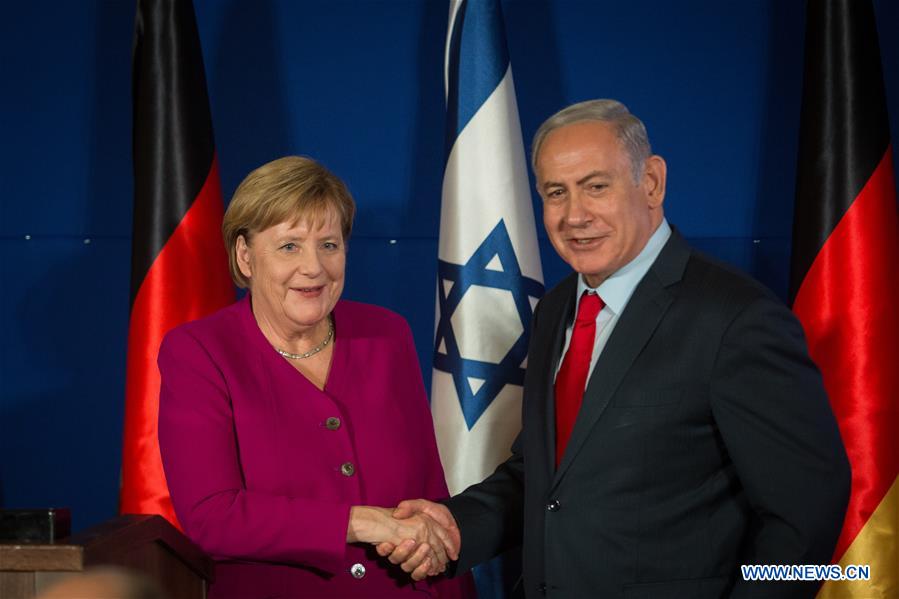
German Chancellor Angela Merkel (L) shakes hands with Israeli Prime Minister Benjamin Netanyahu during their meeting in Jerusalem, on Oct. 4, 2018. German Chancellor Angela Merkel arrived in Jerusalem this week for a quick visit. (Xinhua/JINI)
by Keren Setton
JERUSALEM, Oct. 4 (Xinhua) -- German Chancellor Angela Merkel arrived in Jerusalem this week for a quick visit.
Merkel and Israeli Prime Minister Benjamin Netanyahu do not see eye-to-eye on the Israeli-Palestinian conflict and differ on how to deal with the Iranian nuclear program.
But relations between Israel and Germany, with all the historical baggage attached, remain largely unharmed.
"The relations transcend the differences," said Gisela Dachs, a senior lecturer at DAAD Center for German Studies at the Hebrew University.
"It's a strong and close relationship that can withstand differences of opinion that definitely exist," Dachs told Xinhua.
Israel and Germany have maintained diplomatic ties since 1965. The Holocaust, which happened in Germany, is still haunting the relations between the two countries.
In recent years, differences between Netanyahu and Merkel have become more visible.
As Israelis and Palestinians fail to meet at the negotiating table and Netanyahu has become increasingly critical of the European handling of the Iranian nuclear issue, the two leaders have fewer points of agreement.
Under the Netanyahu government, Israel has increased construction in the Jewish settlements in the West Bank. This policy has caused backlash among the international community and was criticized by Merkel on several occasions.
The German chancellor is a staunch supporter of a two-state solution.
Merkel is not scheduled to visit the Palestinian territories during this short visit which is focused on the bilateral relations between Israel and Germany.
"Outside the Palestinian topic, there are very few disagreements between the two," said Shlomo Shpiro, director of the Europa Institute at the Bar-Ilan University.
At a joint press conference held after their meeting, Netanyahu referred to the differences.
"We have transformed our relationship into a warm and constructive friendship. It doesn't mean that we don't have disagreements, but there is an underlined commitment that I respect," he said.
"We may disagree on how ... but there is no question that we are working toward the same goal, and that is preventing Iranian armament," Merkel said after meeting Israeli President Reuven Rivlin.
Ties of the two countries are indeed extensive. Germany is one of Israel's largest trading partners, with exports into Germany steadily increasing.
In addition, reports say German and Israeli intelligence agencies cooperate frequently and Germany has supplied the Israeli military with six submarines.
"German commitment to Israel has been put to the test and Germany has provided very important systems for its defense," Shpiro said.
"Security of Israel is really the raison d'etre of Germany," Dachs told Xinhua.
This sentiment has been expressed by the German leader many times and the warm relations displayed in Jerusalem are proof of a bond that is almost unbreakable, she concluded.















